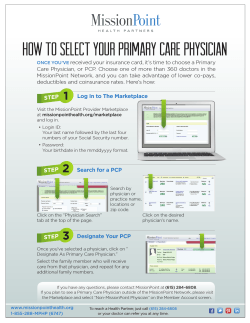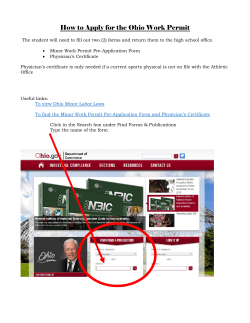
The Indiana POST Program
The Indiana POST Program Physician Orders for Scope of Treatment House Bill 1182 Authored by Rep. Tim Brown, MD, & Rep. Ed Clere In consultation with the Indiana Patient Preferences Coalition When patients nearing the end of life cannot speak for themselves, POST lets health care providers know exactly what treatments a patient does and does not want to receive. Unlike a living will, the POST form contains medical orders that are immediately actionable by all health care providers, including emergency medical personnel. The POST is designed to accompany patients throughout the healthcare system to ensure their wishes are known and honored regardless of the setting. What is POST? The centerpiece of the POST program is an order form that documents a patient’s treatment preferences as physician orders that can be easily understood and honored by health care providers. The POST form documents patients’ preferences to have or decline a range of treatment options, including resuscitation, hospitalization, antibiotics, and feeding tubes. POST is a communication tool that provides information about the current treatment plan. Similar programs are used in 16 states and in development in another 28 states. The POST has been identified as a preferred practice by the National Quality Forum and is recommended by leaders in palliative care to improve the quality and continuity of care. Research suggests that POST is effective at ensuring patient treatment preferences are honored. Indiana needs a POST Program because POST fills a serious gap: Indiana Living Will Out-‐of-‐Hospital DNR POST YES NO NO NO YES YES Can be honored by emergency medical personnel? NO YES YES Available for patients with a terminal condition? YES YES YES Available for patients with advanced chronic progressive illness or advanced frailty syndrome? YES NO YES Requires a physician’s signature? NO YES YES Allows patients to express their preferences for a range of specific treatment options? NO NO YES Patient wishes can be understood without interpretation? NO YES YES Requires a discussion with a health care provider about treatment goals? NO NO YES Allows all adults to document general preferences for end of life care? Physician orders that can be followed outside an acute care hospital? How does POST work? The POST allows patients with advanced chronic disease, advanced frailty syndrome, or terminal conditions to have their treatment goals documented as medical orders. These are patients for whom the physician would not be surprised if they died within the next 12 months because of their advanced disease. Patients with these life-‐limiting conditions experience diminished benefits from treatments and increased burden as their condition progresses. The POST program is recommended for long-‐stay nursing facility residents as well as hospice patients. It is also recommended for qualified patients being discharged from hospitals to nursing homes or to their own home with hospice or home health care. Physicians, nurses, social workers, or other designated health care professionals fill out the POST form based on a meaningful discussion with the patient or the patient’s health care representative, power of attorney for health care, or legal guardian. The POST form takes effect only after the patient's physician reviews and signs the form. However, use of a POST form is always voluntary and patients can change their mind to request alternate care at any time. If a patient’s condition changes, it is appropriate to reconsider the treatment plan. The POST form can always be voided and another form executed with different orders. Otherwise, the POST form remains in effect and should be followed (if medically appropriate) unless there is a different request by the patient or, when appropriate, the patient’s legally authorized representative. Why should YOU support this bill? Your support of House Bill 1182 is essential to improve the quality of care for seriously ill Hoosiers. Research suggests that under the current system in Indiana: o Patients and families struggle with having to make difficult treatment decisions in a crisis rather than through a more thoughtful process in advance. o It is common for treatment decisions made in one health care setting to be lost when patients move between settings. Patients suffer when there is poor continuity of care across treatment settings. o Health care providers often do not have the information they need to honor patient treatment preferences. Legislation is required in order for there to be an Indiana POST Program. POST will help improve the lives of Hoosiers by encouraging conversations in advance and ensuring decisions are documented as medical orders that can be followed by healthcare professionals throughout the healthcare system. Additional Information Additional information about the Indiana POST Program can be found at: http://www.iupui.edu/~irespect/POST.html Or by contacting the Indiana Patient Preference Coalition Co-‐Chairs: Gerald Walthall, M.D., Franciscan St. Francis, at gerald.walthall@franciscanalliance.org Susan Hickman, Ph.D., IU School of Nursing, at hickman@iupui.edu
© Copyright 2025





















